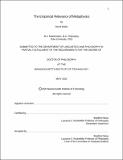The empirical relevance of metaphysics
Author(s)
Builes, David(David Alan)
Download1191839832-MIT.pdf (1.327Mb)
Other Contributors
Massachusetts Institute of Technology. Department of Linguistics and Philosophy.
Advisor
Bradford Skow.
Terms of use
Metadata
Show full item recordAbstract
Are metaphysical debates relevant to ordinary empirical inquiry? This dissertation collects a series of papers which answers in the affirmative. The first part of the dissertation is concerned with inductive inference. I argue that we shouldn't expect the world to be amenable to induction if orthodox versions of Humeanism or Non-Humeanism are correct. I then develop and defend a hybrid view, a 'Humean Non-Humeanism', which has a better hope of vindicating inductive inference. The second part of the dissertation is concerned with self-locating belief. While puzzles regarding self-locating belief are often motivated by certain fanciful thought experiments, it has recently been argued that the epistemology of self-locating belief is of central concern to many of the deepest questions in fundamental physics: including the interpretation of quantum mechanics, large-scale cosmology, and the (alleged) fine-tuning of the universe. I begin by arguing that the correct epistemology of self-locating belief is also relevant to classic debates in the metaphysics of time. By exploiting the fact that different theories in the metaphysics of time classify different sorts of facts as 'merely indexical' facts, it can be shown that different views in the metaphysics of time make different empirical predictions. I then turn to argue for the correct epistemology of self-locating belief on metaphysical grounds. I first argue for some conditional claims: if one holds certain (controversial) metaphysical views regarding the nature of objects, properties, and identity across time, then one should uphold a particular theory of self-locating belief. I then go on to argue for an overall metaphysical picture that vindicates these views concerning the nature of objects, properties, and identity across time.
Description
Thesis: Ph. D. in Linguistics, Massachusetts Institute of Technology, Department of Linguistics and Philosophy, May, 2020 Cataloged from the official PDF of thesis. Includes bibliographical references.
Date issued
2020Department
Massachusetts Institute of Technology. Department of Linguistics and PhilosophyPublisher
Massachusetts Institute of Technology
Keywords
Linguistics and Philosophy.